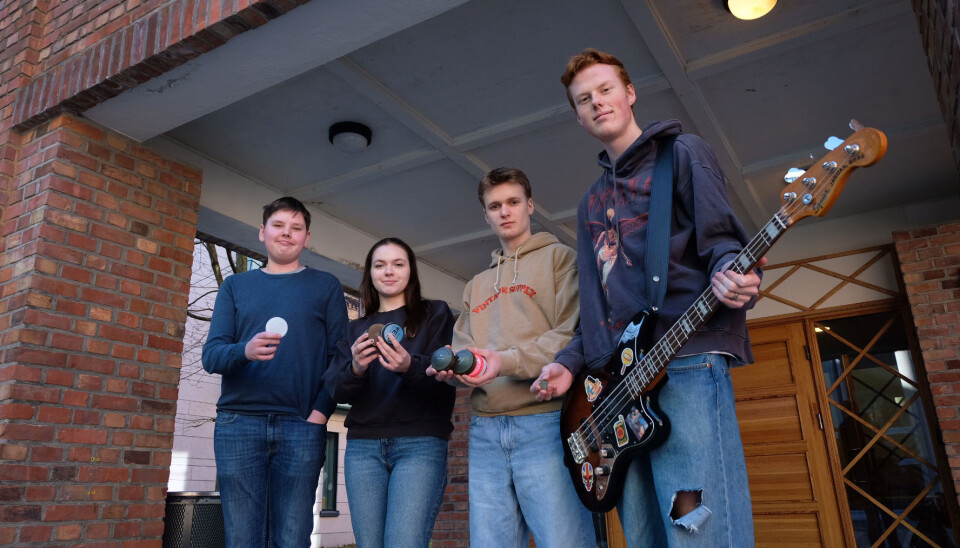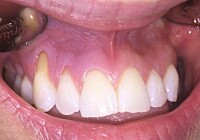This is what students make from old snus boxes
"They go from being trash to having real value."

'Over 100 million snus boxes are sold in Norway every year.'
That's what it says in the brochure from the student company Replekt UB.
And with that, 1,500 tonnes of green plastic go in the bin.
"We wanted to do something about that," says Einar Aleksander Strand-Nilsen from Replekt UB.
A small but important tool
Sciencenorway.no visits the student company at Kirkeparken Upper Secondary School.
The students collect empty snus boxes and repurpose them into guitar picks.
"A guitar pick may be small, but it's an important tool for guitarists," says Thobias Wright Ek.
He demonstrates by strumming the strings of a guitar.
"It produces better sound and protects your fingers," he says.

From waste to value
Research shows that snus is harmful to your health.
Despite this, 22 per cent of young people aged 16 to 24 use snus daily.
This is evident in the collection boxes the students have set up at the school.
"There are empty snus boxes in them every time we check," says Rebeka Aranyos.
"They go from being trash to having real value," says Damian Bredahl

Punk and picks
The journey from snus box to guitar pick involves four steps:
- The snus boxes are collected and washed.
- The stickers must be removed.
- The boxes are ground into small pieces.
- The pieces are melted and cast in an aluminium mould.
The guitarist in the student enterprise values the opportunity to use sustainable picks.
"I play punk music, and picks often only last a couple of songs," says Wright Ek.
And when they do break, they can be remelted and repurposed.
"It feels good to combine music and recycling in this way," he says.

Endless recycling?
"This is an important collection effort," says Leiv K. Sydnes.
He is a chemist and has researched plastic for many years.
"Imagine turning waste into useful products," he says.
Many snus boxes end up in general waste and are incinerated.
"That means the plastic is not reused," he says.
The type of plastic used in snus boxes has been produced for nearly 70 years.
It is called polypropylene, or PP plastic.
"If we managed to recycle all plastic, we would already have enough in the world," says Sydnes.
That would be the ideal scenario. Plastic, after all, is derived from oil and gas.
But recycling is not always straightforward.

100 million stickers
"That's because plastic products are made up of various components," says chemist Sydnes.
The snus box is a good example.
It consists of plastic, but also contains dyes and chemicals that make it flexible.
It also has adhesive labels made of glue and paper.
"This hinders the recycling process," says the chemist.
The stickers are difficult to clean off, and the students remove them by hand.
Imagine doing that with 100 million snus boxes.

Smarter recycling needed
The chemist argues that stricter regulations are required.
"Future plastics must be designed to be more easily recyclable," says Sydnes.
Those who manufacture plastic must consider recycling from the start.
"Snus boxes, for example, could be laser-engraved instead of having stickers," he says.
Changing over time
"How many times can the students remelt the guitar picks?"
"Quite a few, but it's difficult to give a precise number," says Sydnes.
Each time the plastic is remelted, some of the softening agents are lost.
"That might even affect the sound quality of the guitar. It’s something the students can monitor," he says.
As the softeners break down, there is also a risk they could become airborne.
"The students need to protect their health and wear masks when melting the plastic," the chemist says.


Considering a continuation
The student company is part of the second-year of upper secondary school.
As it stands, the plan is for the company to be dissolved when the school year ends.
However, the students are now exploring the possibility of continuing the project.
"We can clearly see that the concept works," says Aranyos.
———
Translated by Alette Bjordal Gjellesvik
Read the Norwegian version of this article on ung.forskning.no
Reference:
SINTEF: Tomme snusbokser skal bli nye produkter (Empty snus boxes will be turned into new products), 2023.
Related content:

Subscribe to our newsletter
The latest news from Science Norway, sent twice a week and completely free.


























































